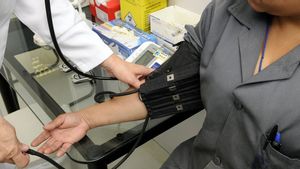JAKARTA - Unpleasant news came from Susilo Bambang Yudhoyono. The 6th President of the Republic of Indonesia was sentenced to be suffering from prostate cancer. This news was delivered directly by SBY's personal staff, Ossy Dermawan, on Tuesday, November 2.
According to WHO data, prostate cancer is the most common type of cancer experienced by men. At least, there are 1.3 million men worldwide suffer from prostate cancer. This cancer is ranked 2nd in Indonesia as the most common cancer in men.
Launching Mayoclinic, Tuesday, November 2, prostate cancer is caused by genetic mutations in cells in the prostate gland. However, the cause of these cell mutations is not known with certainty. Genetic mutations tell cells to grow and divide faster than normal cells. These abnormal cells will continue to live, thus killing normal cells. The accumulation of abnormal cells forms a tumor that can grow to invade other nearby tissues. If not prevented immediately, the abnormal cells will rupture and metastasize to other parts of the body.
In addition to cell changes, there are also several factors that increase the risk of prostate cancer as experienced by SBY, such as increasing age, suffering from obesity, eating less fiber, exposure to chemicals, suffering from sexually transmitted diseases, and having a family history of prostate cancer.
In its early stages, prostate cancer does not show significant symptoms. However, when the cancer gets bigger, the patient will feel symptoms in the form of urination disorders, such as difficulty urinating or urinating less smoothly.
Prostate cancer like that experienced by SBY can cause several complications if not treated properly, such as;
Cancer that spreads (metastasizes). Prostate cancer can spread to nearby organs, such as the bladder, or spread through the bloodstream or lymphatic system to the bones or other organs. Prostate cancer that spreads to the bones can cause pain and fractures.
If the cancer has spread to other areas, it is likely to be difficult to cure but still treatable and controllable.
Incontinence. Both prostate cancer and its treatment can cause urinary incontinence. Treatment for incontinence depends on the stage of cancer you have, how severe it is, and the chance that the cancer will improve over time. Surgery, medication, and the use of catheters are methods of treating incontinence.
Erectile dysfunction. Erectile dysfunction can be caused by prostate cancer or its treatment, including surgery, radiation or hormone treatment. Medications, vacuum devices that help achieve an erection and surgery are available to treat erectile dysfunction.
The English, Chinese, Japanese, Arabic, and French versions are automatically generated by the AI. So there may still be inaccuracies in translating, please always see Indonesian as our main language. (system supported by DigitalSiber.id)













